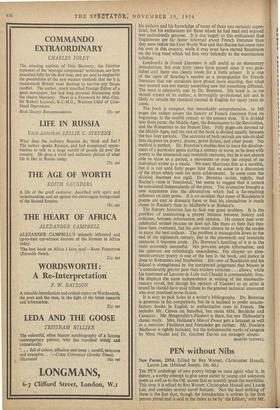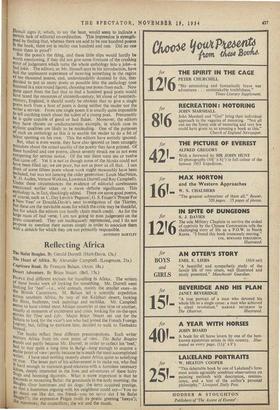PEN without Nibs
New Poems, 1954. Edited by Rex Warner, Christopher Hassall, Laurie Lee. (Michael Joseph. 10s. 6d.) THE PEN anthology of new poetry brings us once again what is, in theory, a worthy attempt to give some outlet to young and unknown poets as well as to the OK names that so notably grace the monthlies. This time it is edited by Rex Warner, Christopher Hassall and Laurie Lee, and contains several novel features. Not the least striking of these is the fact that, though the introduction is written in the first person plural and is said in the index to be by 'the Editors,' only Mr. Hassan signs it, which, to say the least, would seem to indicate a Certain lack of editorial co-ordination. This impression is strength- !Med by finding that, whereas there are said to be one hundred poems ba the book, there are in reality one hundred and ono. Did no one
unt them in proof? •
But the poem's the thing, and these little slips would hardly be Worth mentioning, if they did not give some foretaste of the crashing error of judgement. which turns the whole anthology into a joke—a bad joke. The editors, so Mr. Hassall says in his introduction, have had the unpleasant experience of receiving something in the region of ten thousand poems, and, understandably daunted by this, they decided to put as many poets as possible into the anthology (one hundred is a nice round figure), choosing one poem from each. Now quite apart from the fact that to find a hundred good poets would have taxed the resources of sixteenth-century, let alone of twentieth- century,. England, it should surely be obvious that to give a single Poem each from a host of poets is doing neither the reader nor the Writer a service. From one single poem it is usually quite impossible to tell anything much about the talent of a young poet. Presumably he is quite capable of good or bad flukes. Moreover, the editors rnaY have chosen an uncharacteristic example, in which case its stylistic qualities are likely to be misleading. One of the purposes of such an anthology as this is to enable the reader to do a bit of talent spotting on his own. This the editors have entirely ignored. But, what is even worse, they have also ignored or been strangely Mistaken about the actual quality of the poetry they have printed. Of these hundred and one poems, about seventy struck me as not even competing for serious notice. Of the rest there were ten or twelve that came off. Yet it is not as though some of the blanks could not have been filled up; we are poor, but not as poor as all that. I can think of some fifteen poets whose work might reasonably have been Lncluded, but was not (among the older generation: Louis MacNeice,. _vv. H. Auden, Vernon Watkins, Lawrence Durrell and Roy Campbell). under these circumstances the evidence of editorial carelessness mentioned earlier takes on a more definite significance. This anthology is, in fact, shockingly edited. There are some good poems, of course, such as C. Day Lewis's 'Pegasus', G. S. Fraser's 'Prayer For New Year' or Donald.Davie's neat investigation of the Thirties, but these are the inevitable oases for which the critic may be thankful, but for which the editors can hardly claim much credit. As for the large mass of bad verse, I am not going to pass judgement on the Poets concerned. They are inadequately represented, and I do not Propose to mention their arames simply in order to associate them With a debelcle for which they are not primarily responsible.
ANTHONY HARTLEY











































































 Previous page
Previous page